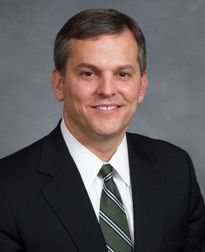North Carolina Poised for 3rd Straight Gubernatorial Election between Statewide Elected Officials
A dive into yet another measure of the Tar Heel State’s battleground state status
 As Democrats seek to flip New Hampshire’s open gubernatorial seat in 2024, the party will also be making a strong effort to defend its own open seat in North Carolina where Governor Roy Cooper is term-limited.
As Democrats seek to flip New Hampshire’s open gubernatorial seat in 2024, the party will also be making a strong effort to defend its own open seat in North Carolina where Governor Roy Cooper is term-limited.
The filing deadline for next March’s primary ended last Friday with sitting state Attorney General and Democratic frontrunner Josh Stein (pictured) set to face four candidates including former state Supreme Court Justice Michael Morgan.
The expected Republican nominee, Lieutenant Governor Mark Robinson, will square off against two opponents including state Treasurer Dale Folwell.
If Stein and Robinson (or Folwell) emerge victorious from their respective primaries, it will mark the third consecutive cycle in which sitting elected statewide officeholders met in North Carolina’s gubernatorial general election.
In 2016, four-term Attorney General Roy Cooper defeated Governor Pat McCrory. Four years later, Governor Cooper defeated GOP Lieutenant Governor Dan Forest.
Both major parties in North Carolina have nominated sitting statewide elected officials in only one other cycle since Reconstruction.
That occurred in 1988 when Republican Governor Jim Martin defeated Democratic Lieutenant Governor Robert Jordan to lead the state for a second term.
Of course, part of the reason North Carolina is seeing more of these impressive resumes on both sides of the ballot in gubernatorial elections is because the state is so evenly divided – with both parties winning seats up and down the ballot.
For example, in 2020, Republicans won six statewide offices while Democrats claimed four. All 10 of these state executive elections were decided by less than eight points, and eight of them were decided by less than five points.
It should also be noted that North Carolina governors could not run for a second full term prior to 1972. But that is only part of the story.
Across the 23 election cycles from 1884 through 1972, only four gubernatorial nominees were sitting statewide officeholders:
- 1916: Democratic Attorney General Thomas Bickett
- 1948: Democratic Commissioner of Agriculture Kerr Scott
- 1956: (Ascended) Governor Luther Hodges
- 1968: Democratic Lieutenant Governor Bob Scott
All four were elected.
By contrast, across the last 12 cycles from 1972 through 2020, a total of 15 nominees were sitting elected statewide officers, with at least one on the ballot each cycle – including nine non-gubernatorial incumbents:
- 1976: Democratic Lieutenant Governor Jim Hunt (elected)
- 1984: Democratic Attorney General Rufus Edmisten (lost)
- 1988: Democratic Lieutenant Governor Robert Jordan (lost)
- 1992: Republican Lieutenant Governor Jim Gardner (lost)
- 2000: Democratic Attorney General Mike Easley (elected)
- 2008: Democratic Lieutenant Governor Bev Perdue (elected)
- 2012: Democratic Lieutenant Governor Walter Dalton (lost)
- 2016: Democratic Attorney General Roy Cooper (elected)
- 2020: Republican Lieutenant Governor Dan Forest (lost)
Democratic Governors Jim Hunt (1980, 1996), Mike Easley (2004), and Roy Cooper (2020) and Republican Governors Jim Martin (1988) and Pat McCrory (2016) also were renominated during this period.
In addition to electing statewide officials from both parties, North Carolina’s battleground state status in recent decades is also evident from its U.S. Senate elections.
Since 1990, North Carolina has the lowest average margin of victory in the country for the office at just 5.5 points with 11 of its 12 contests decided by single digits during this span. [Democrats have come up on the short end of the stick in all but two of these dozen elections].
Follow Smart Politics on X/Twitter.

Do you know when the last time this occurred (in any state) was? After a cursory search I found Nevada, 1978-1986:
*1978: attorney-general Robert List (R) vs. lieutenant governor Robert E. Rose (D)
*1982: attorney-general Richard Bryan (D) vs. governor Robert List (R)
*1986: governor Richard Bryan (D) vs. treasurer Patricia Dillon Cafferata (R)
… but I am not sure if this was the most recent.
Several states have had close calls, including California where, among all major-party nominees between 1971 and 2001, just two did not hold a statewide elected office at the time of their campaigns: Los Angeles mayor Tom Bradley (1982, 1986) and San Francisco mayor Dianne Feinstein (1990).
Also, will this be the last post of 2023? If so, I’d like to wish everyone here a happy holiday season!
I can’t find a more recent occurrence, either.
Oregon did have an earlier four-election streak, from 1958-70:
1958: Secretary of State Mark Hatfield vs. Gov. Robert D. Holmes.
1962: Gov. Hatfield vs. Attorney General Robert Y. Thornton.
1966: Secretary of State Tom McCall vs. State Treasurer Robert Straub.
1970: Gov. McCall vs. Treasurer Straub again.
NB that in Oregon, the secretary, AG, and treasurer are all elected on a different cycle than the governor (presidential years for the lower offices, midterms for the governor), which means the occupants of those offices don’t have to choose between seeking reelection and running for governor.
Happy holidays to all! And to all a good night!
Merry Christmas and happy new year to all of you and your families. Next year please get everybody you can out to VOTE like your lives depend on it.
– 1956: (ASCENDED upon death of predecessor “Bill” Umstead) Governor Luther Hartwell Hodges, the last governor to have served more than 4 years before “Jim” Hunt
– Has any incumbent Tar Heel US senator ever bid for governor, like CA US Senators “Bill” Knowland (1958) and “Pete” Wilson (1990)?
– Merry X-mas & happy Season to fellow readers of SP!
Indeed ‘ascended’ – thanks very much for catching that typo!